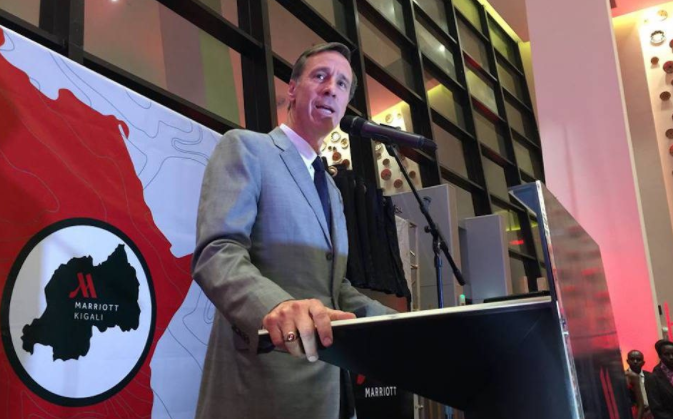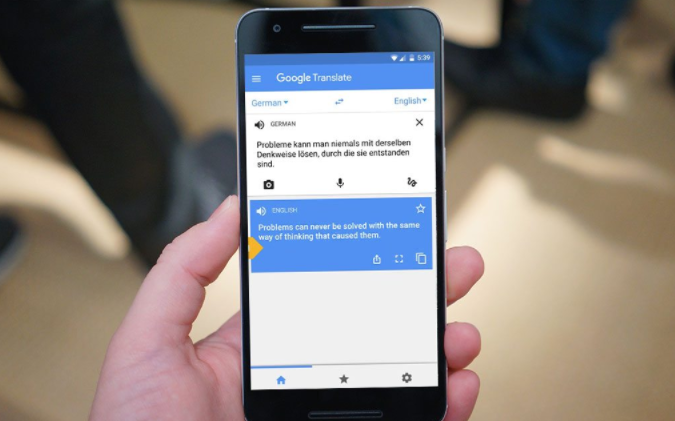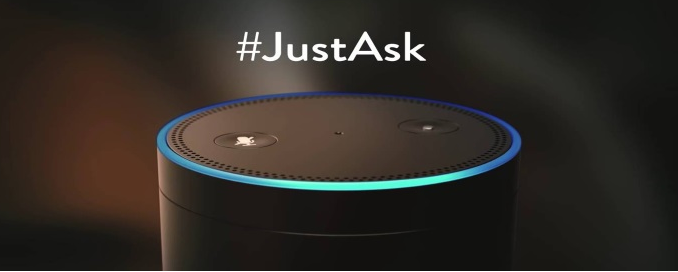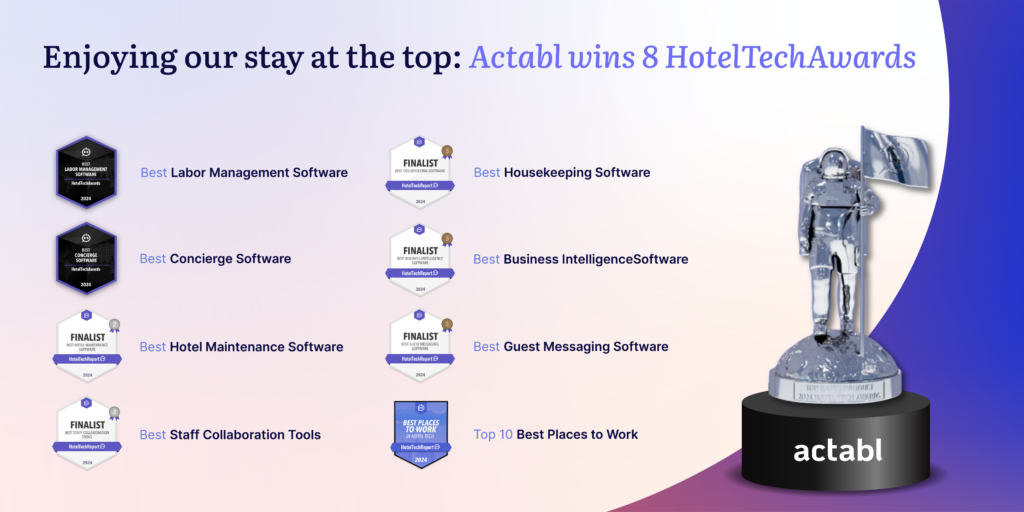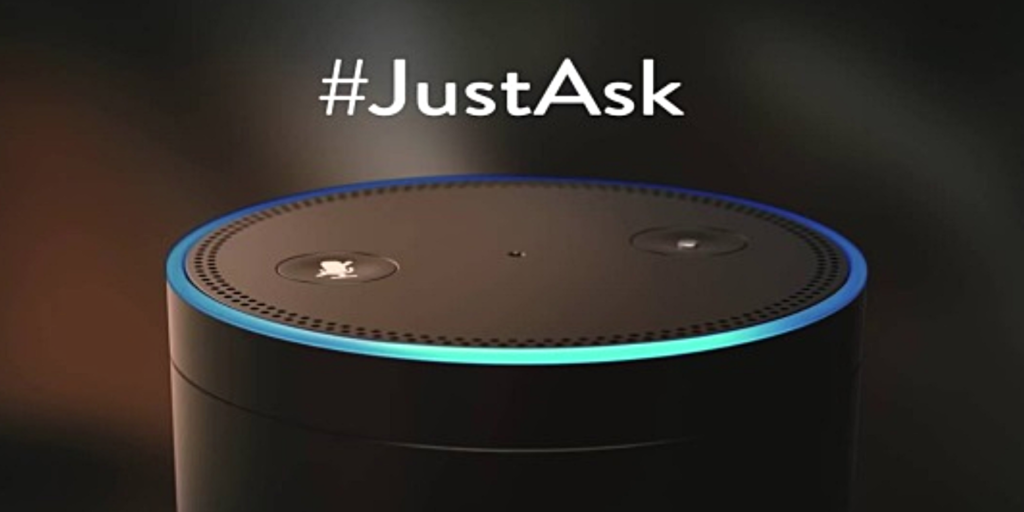
When Technology Becomes a Risk – ALICE Newsletter 46
In Newsletter #46: Technology’s risks and rewards | Como se dice “better translations”? | Amazon’s return to travel
It’s been a great lead up to Memorial Day, and three thought-provoking pieces below highlight that. If you are not a big reader, Duetto puts out some great short videos on the challenges of the current technology stack and the challenges and benefits of moving to the cloud, and we are excited to announce next week a joint webinar with them on optimizing the entire hotel experience through cloud technology. If you want to be invited, email me at alex@alice-app.com and we’ll make sure to include you. If you are going to HITEC, definitely join as we will try to sneak in a guide to the show at the end.
Also incredible to see just how hot machine learning is right now. Si Hao, one of our interns, went to the TechCrunch Disrupt conference last week and his main takeaway of all the new technology pitches was simply “Wow, every single pitch is for a machine learning startup.” Remember when the same was said of apps? An app for cars… … an app for pizza… an ALICE app for room service ;)…one such machine learning innovation that could really help hotels is Google’s recent breakthrough with translation (#2 below). Google is starting to figure out sentence-based translation (i.e. instead of translating word by word in the order they are written). Read more on that below. In short, I do think we will see a day when it will be forgivable not to have a front desk team speaking seven languages and to just have a device (like Alexa… highlight #3 below) at the front desk that your foreign guests can speak into to speak with your English-speaking team. Definitely a cost saver once consumers become more comfortable with better translation technology in travel.
Conference season is fast upon us, so here’s our schedule:
-
NYU Investment Conference (New York) is June 5th.
-
HITEC (Toronto) is June 26th-29th.
We can get hoteliers free tickets for HITEC, so let us know if you want to join us.
Happy Memorial Day,
Alex Shashou
HIGHLIGHTS FROM THE WEEK’S NEWS…
The biggest risk in the Marriott-Starwood merger
Skift | Marriott CEO: Technology Is the Biggest Risk in the Starwood Merger
WIT |As Hotel Technology Turns The Corner, Properties Should Carefully Examine Systems
Why it matters:
“If you could design your tech platform to work in concert from the beginning, how would you do it?,” asks Duetto co-founder and CEO, Patrick Bosworth, in his recent WIT op-ed.
While the exact answer to this question differs from property to property, what’s almost for certain is, for most hotels, the new design would look nothing like what they have now. As we, and other recent entrants in the hospitality technology space, have written about before, the hotel industry has traditionally been challenged by a “spaghetti” of hotel systems: a mess of 20 different logins, siloed data, and standalone solutions, precluding the integrations and interoperability necessary to have a holistic picture of your hotel operations and provide a personalized guest experience.
The Marriott-Starwood merger puts this problem in sharp relief. As Marriott CEO Arne Sorenson revealed during a recent earnings call, the biggest risk associated with the merger has to do with technology, and more specifically, reconciling the diverse (and largely incompatible) set of systems across this now vast portfolio of hotels. “I think if we identify one [risk] it’s going to be around technology…. [We’re] maybe most fearful about it, but also most convinced it will drive upside, longer term to the entire portfolio,” he told his audience of investors and analysts.
But while Marriott’s dilemma makes the challenge and necessity of consolidating system obvious, the same predicament exists today within just a single hotel. As Bosworth notes, technology is simultaneously a performance enhancer and performance diminisher at most hotels. The upside of most technology is clear, but as technologies accumulate, the resulting assemblage holds back hotels, preventing the ability for staff departments to communicate with one another or for guest data to be retained. Furthermore, this spaghetti of systems can actually impede newer technologies from fulfilling a promise of greater connectivity or more business intelligence.
Bosworth acknowledges reconciling your hotel tech stack might be tough work, but will ultimately be worth it. To start, he says, “a quick win might be to move just data, rather than the mission-critical systems, off premise. A cloud-hosted system for storing reservation or transaction data could centralise it where the PMS, CRS and other systems can update it in real time. Other technology vendors could also call upon that data in the same place to use in different applications or software programmes.” Going forward, Bosworth continues, “hotels should continue to insist on and push for interoperability among their different systems — either on premise or in the cloud. An inflection point will come, not necessarily when every hotel has every piece of its tech stack in the cloud, but rather when a majority of hotel systems can at least integrate with one another and use the same data.”
Como se dice “good for hotels”?
Skift |Google’s New Translation Tech Takes a Great Leap Forward
Why it matters:
Translation technology is getting better, and this is good news for hotels.
We have all used Google Translate at some point, and it sort of worked. Most of the time we could convey more or less the message we needed to. But, for a hotel trying to provide great service, “sort of” doesn’t quite cut it!
Recently, as Skift reports, companies like Google, Facebook, and Microsoft are making big advances in text translation, due to the emergence of so called “neural machine translation,” which facilitates the translation of sentences as a whole, rather than word by word. Although it’s been known for a while that sentence-level translation yields better results, computers have lacked the processing power required to do this in any reasonable amount of time. The rise of artificial intelligence and machine learning, however, has enabled companies to take advantage of this more effective technique. Google, for one, says its translation service has improved more this year than in the last ten years combined.
As Skift notes, more accurate translation has major implications for travel and hotels, particularly in markets where English proficiency is rare. In India, for example, one out of five of the country’s 1.3 billion inhabitants doesn’t speak English. Better translation means more travelers (who now have the freedom to travel to places where they don’t speak the language) and greater accessibility to hotels in far-flung places, which don’t have the budget for multiple websites or for multi-lingual staff. Indeed, better translation technology spells cost-savings and improved service even for hotels in the United States, which can now serve a global guest base much more effectively, both at booking, and during their stay.
Amazon’s return to travel?
Tnooz |Amazon and its return to travel via the back door
Why it matters:
The last time we covered Amazon as travel “player” was way back in Newsletter #8 (Oct 2015), when the e-commerce giant shut down its Amazon Destinations experiment. If you recall, Destinations was Amazon’s bid to become a booking site for weekend getaways.
Since then, Amazon’s Alexa voice recognition technology has become somewhat of a preoccupation for us. Others in hospitality have also been intrigued by this new interface, with hotels like Wynn Las Vegas placing the Echo device in every room (as we reported on in Newsletter #37).
This week, tnooz’s Kevin May wrote an intriguing piece on how Alexa could be a back-door route for Amazon back into travel. From what we’re hearing ourselves anecdotally in the market (and in our office — one of our interns, David, is attempting to program Alexa to send requests into ALICE as we speak!), we have to agree.
As Kevin writes, the entire travel journey is heavily reliant on Google today. In a 2014 travel report Google published, around 55-60% of all travelers use search engines as a resource in their booking journey. Aka, Google is in the power seat! But now, with the increasing promise of voice technology (if you recall, Expedia chairman Barry Diller is on record saying ‘voice’ would take over as the interface for websites), Kevin predicts, should Amazon’s Alexa continue to outsell its rivals, Google’s dominance as the company that receives all travel questions may be under threat. If Google wanes in influence and Amazon rises, this will spell a complete rethinking of hotel search marketing as it exists today.
-
- How Online Reviews Have Been A Blessing For Travelers And A Curse For Some Big Hotels Market Watch
- Questions Hoteliers Should Ask Before Making A Technology Purchase Decision eHotelier
- Vacation Rental Managers Don’t Have the Tools to Scale Hospitality Skift
- Hotel Chatbots Aren’t The Future. They’re The Present. Hotel Speak
-
What Hospitality Means to Times Restaurant Critic Pete Wells New York Times
{{cta(‘3a1b7b2f-4be7-4c26-9bbd-03a0b82288b8′,’justifycenter’)}}



